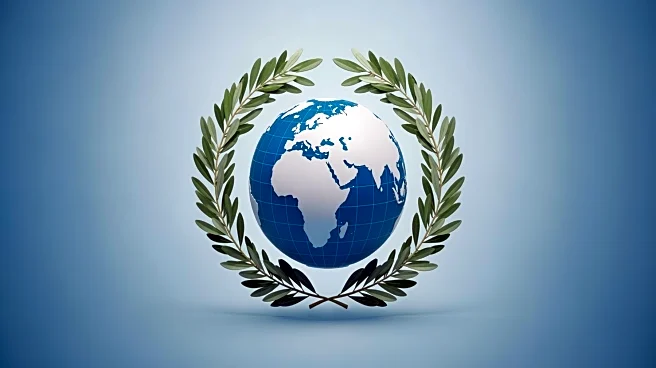What's Happening?
The United States has circulated a draft United Nations Security Council resolution aimed at establishing an international force in the Gaza Strip for a minimum of two years. This initiative, reported
by Axios and Israeli media, is part of a broader effort to stabilize the region following a landmark deal brokered by President Trump. The proposed International Stabilization Force (ISF) would be responsible for securing Gaza's borders with Israel and Egypt, protecting civilians, and training a new Palestinian police force. The draft resolution, labeled 'sensitive but unclassified,' outlines a mandate that includes the demilitarization of the Gaza Strip, a key demand from Israel. The resolution is currently under negotiation among Security Council members, with the goal of voting on it in the coming weeks.
Why It's Important?
The establishment of an international force in Gaza represents a significant diplomatic effort to bring lasting peace to a region long plagued by conflict. The resolution, if passed, could reshape the Middle East by addressing security concerns and facilitating reconstruction efforts. The involvement of an international force underscores the seriousness of the U.S. and its allies in ensuring the success of the peace agreement. However, the success of this initiative hinges on the cooperation of various stakeholders, including Israel, Hamas, and other Arab countries. The resolution's emphasis on demilitarization and the training of a new police force could lead to a more stable and secure environment in Gaza, benefiting both Palestinians and Israelis.
What's Next?
The next steps involve detailed discussions among UN Security Council members to finalize the mandate and operational terms of the international force. The Trump administration faces the diplomatic challenge of securing agreement from participating countries to contribute troops and resources. Additionally, the resolution's success will depend on the willingness of Hamas and other Palestinian factions to comply with demilitarization efforts. The international community will closely monitor these developments, as the outcome could have far-reaching implications for regional stability and international relations.
Beyond the Headlines
The proposed resolution raises important questions about the role of international forces in conflict zones and the balance between peacekeeping and enforcement. The distinction between an 'enforcement force' and a 'peacekeeping force' is crucial, as it suggests a more proactive approach to maintaining order and security. This could lead to potential confrontations, highlighting the need for clear rules of engagement and robust support from the international community. The resolution also reflects broader geopolitical dynamics, as countries weigh their involvement based on strategic interests and regional alliances.









